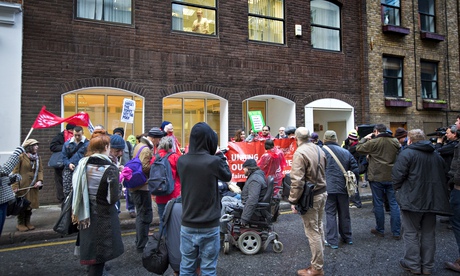As Britain follows the US in tearing up its safety net, the story of social security needs to be retold from the very beginning

The rip-roaringly successful 4’s Benefits Street, on Channel 4, is being followed up by Immigrant Street. This a year after the same station’s Benefits Britain 1949 – to middle England’s delight – subjected contemporary welfare claimants to the social security rules of the ration-book years, as applied by real-life bullying bureaucrats with real jobcentre experience. Meanwhile, Channel 5 has developed its own pauper-baiting programme,On Benefits & Proud, and its cousin, Gypsies On Benefits & Proud.
The boom in poverty porn suggests that the left is getting thrashed on social security, and the polling confirms this. There is still support for the general principle of a safety net and a ladder of opportunity, but turn to the practicalities of particular benefits and suspicions about freeloaders rise as jealousies break out in every direction. Listening to voices from across Britain for my book Hard Times, I found not only workers complaining about the unemployed getting an easy ride, but also jobless people grumbling that the low-paid got more help than them nowadays, not to mention striking mutual antipathy between recipients of different benefits.
To see where this debate could lead, glance across the Atlantic. Four decades after Ronald Reagan invoked the “welfare queen”, the nearest thing America had to income support is long abolished. There is charity, and sometimes state and local relief, but many a chronic health condition goes untreated, and penury abounds. The right, however, still refuses to relent. Paul Ryan, the Republican pick for vice-president in 2012, said about Medicaid and food stamps that year: “We don’t want to turn the safety net into a hammock that lulls able-bodied people into lives of dependency and complacency.” It is remarkable that such language is not being used about cash payments that could be misspent but about programmes to provide food and medicine to poor people in the world’s richest economy.
As the coalition freezes, cuts and applies punitive “sanctions”, we’re heading the same way faster than anyone would have thought possible a few years ago. The only chance of arresting the drift is somehow resetting the whole discussion from first principles.
Benefits are paid out on many different bases around the world. In France, there is still a meaningful connection between earnings, social contributions paid in, and benefit paid out. In parts of northern Europe, unions retain a hand in collecting premiums and administering payments, forging a link between benefits and a concrete institution less remote and alien than “the welfare state”. In New Zealand, a flat-rate pension – available to all seniors, on the strength of residency alone – represents an entirely different way of thinking about benefits, more related to universal rights.
No real-world system ever fits any theory perfectly. Even the fondly remembered Beveridge settlement of the 1940s was riddled with compromise. A stern Victorian, William Beveridge himself was serious about social insurance, properly funded by contributions that built up over time. But Attlee was rightly concerned about the pressing needs of the already elderly, who had never had a chance to pay in, so it was operated as pay-as-you-go from the off. There was also – as there almost always has to be – a means-tested safety net to catch those who would otherwise sink, something that compromised the ideal of “earned” benefits.
Underlying the unloved mosaic of contemporary British benefits lurks a mishmash of half-forgotten principles. In the field of disability alone, there are income top-ups that embody poverty relief, allowances based on contribution records, and other benefits contingent on nothing but health, which reflect ideas about economic rights – even if it does not feel that way as the coalition hacks them back. But through the muddle, there are some definite trends. The proportion of non-pensioner benefits linked to contributions in the UK has dropped by around two-thirds since the 1970s, with means-testing filling the gap, turning welfare payment into the sort of residual function Richard Titmuss was thinking of when he warned that services for the poor would become poor services.
There will, then, always be fixes and workarounds. The important thing is that citizens should be able tell a rough story about how the system works. That sense of a story is what we have lost, and must now restore. But how?
The Institute of Public Policy’s Condition of Britain report suggests replacing some ill-understood cash benefits with public services, particularly in childcare, where – it says – state nurseries would not only be more loved, but also more efficient than under today’s morass of subsidies. Building social houses instead of writing cheques to landlords for owning scarce private homes likewise has commonsensical appeal. The IPPR also proposes refreshing the contributory link by turning the national insurance fund into the sort of independent body Beveridge envisaged, while also increasing jobseeker’s allowance for unemployed workers who have previously paid in.
There would need to be adjustments to “credit in” parents and carers who can’t work and also, arguably, the increasing band whose temporary, part-time or zero-hours jobs make for patchy careers. This leads some radical voices, such as left-leaning Compass, to call for a citizen’s income, paid to all and clawed back through taxes from those who don’t need it. A payment for everybody could hardly be painted as the preserve of the scrounger, and the proposal would deal – at root – with the financial anxiety of our times.
I’ve got my doubts about affordability, and also the pitch to voters often none too keen on rights. But what I admire here is Compass’s willingness to pose the big questions. You might prefer the story about rights to social security, or you might prefer a yarn about the duty to contribute to social insurance. Either, I’d say, is preferable to today’s tragic tale of welfare’s decline.

No comments:
Post a Comment